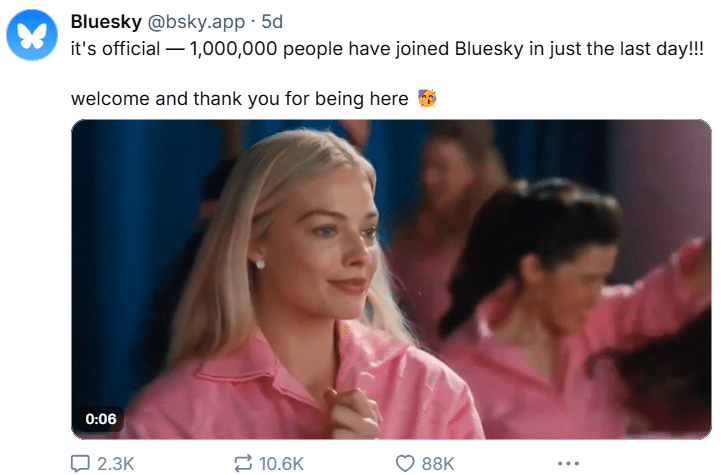Ever since Elon Musk took over Twitter in 2022, fired the majority of its employees and renamed it X, there have been concerns about the future of the social network formerly known as Twitter. The big question is: is it time to leave?
For the past two years, concerns about the increasing volume of fake news, conspiracy theories and extremist views, apparently propagated by bots and foreign powers have dominated media coverage of the platform.
The acrimonious 2024 US election, in which Musk played a very prominent and active role in Trump’s triumph, seems to have re-energised what’s becoming known as the X-odus.
On 13th November, The Guardian announced it was stopping posting to X from its official accounts, citing the prevalence of far-right conspiracy theories and racism on the platform.
This announcement follows those of many other high-profile brands, such as Target and Best Buy. Others, including Disney, Apple and IBM paused their adverts on the platform in 2023, concerned about their brand appearing alongside extremist content.
Now, thousands of formerly active X users are following suit. The celebrated author, Stephen King, joined their ranks in mid-November 2024:
I’m leaving Twitter. Tried to stay, but the atmosphere has just become too toxic. Follow me on Threads, if you like.
— Stephen King (@StephenKing) November 14, 2024
Are B2B companies leaving X?
At OST, we manage the social presence of some of the world’s best-known B2B companies. While we haven’t had any clients quit X completely, the majority are no longer investing in advertising or content. Many are simply ‘sitting’ on their profiles.
We are advising new clients that are just building out their social media portfolios not to include X, unless there’s a particular reason to do so.
In recent months we’ve also started to see vocal members of the communities we manage packing up and leaving the platform [shout-out to the excellent, Kathryn Bezuidenhout in our Community Team for monitoring and sharing this]. To be clear, these are people who have been cornerstone members of really active communities. It’s a really big deal that they are leaving.
There is a real sense that a line has been crossed; that for many people it has become morally unacceptable to be present on X.
Leaving X has been seen as a political statement for some time now. What’s changed is that remaining on the platform is now seen in a similar light.
Should you close down your company accounts?
Our advice to clients asking which social networks they need to be present on has always been: you need to be where your customers are.
In the case of X (and Twitter), there have always been strong communities, such as niche technology groups, on the platform, and we’ve successfully tapped into these for our clients for many years.
Beyond these groups, the most impactful B2B opportunity on X has largely been around events, where live posting and engagement has contributed to buzz and helped drive awareness.
The majority of B2B companies, though, have maintained a presence on X because they felt they “have to be there”. Alongside Facebook/Instagram, LinkedIn and YouTube, X has been a necessary social network to maintain a credible and complete business presence.
But this is what’s changed: for many people, X is no longer a credible social network.
Worse than that, maintaining a presence on the platform could now be considered a political statement that aligns your company with the values on display in people’s X feeds. We are possibly just a few steps away from brands being called out for being on X, in the same way as those still trading in Moscow or St Petersberg were in 2022-3.
In light of this dramatic change of mood, thousands of brand teams around the world are urgently reviewing their company’s presence on X.
Should you switch to Bluesky or Threads?
While leaving X, or maintaining a dormant account, may be the simplest option, there are other social networks that offer similar features to X.
As a direct result of the X-odus, platforms such as Bluesky, Threads and Mastodon have seen spikes of new users. To date, Bluesky – which users say offers a noticeably more positive vibe than X – has been the clear winner.
Originally started by one of Twitter’s co-founder’s, Jack Dorsey, it has a very similar interface to X which makes it a natural transition for many. However, unlike X, the algorithm plays a much smaller role in your feed which is largely chronological. The lack of bots and paid for ‘blue tick’ accounts also appeals to many who enjoyed the early days of Twitter.

The result of this is that last week it signed up 1 million new users in a single day for the first time, and it has gone on to repeat that feat since.
Before you decide to switch your business across, though, we would question the purpose of opening a new account. If you have an active community on X that you plan to invite across – that might make a lot of sense. There’s also an opportunity to get ahead of your competitors and build an early reputation on the platform. However, if you’re starting from scratch, bear in mind that all of the X alternatives have comparatively tiny user-bases, for now at least.
The scene is changing rapidly, but as of today Bluesky reportedly has 20 million active daily users, while Threads has 33 million (Aug. 2024). In spite of its troubles, X still boasts around 250 million active daily users. As such it is still the only platform of its type that can realistically sustain a social media growth plan.
The question is: are you comfortable being there?
Are you planning on joining the X-odus or switching to another platform? We’d love to hear your views. Please comment or send us your feedback.

